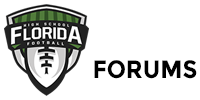-
Posts
-
Okay, how about that STA vs. Ida Baker matchup in your first round? Does your analogy extend to South Florida slappies? My opinion is simply that no one (except CoachGraham, apparently) would be interested in the 1 vs. 512, 2 vs. 511, and 200 other mismatches such a format would produce, regardless of geography. But I could be wrong. And now I'm thinking I should have skipped college.
-
By nolebull813 · Posted
Complaining about North Florida slappies losing to South Florida powers is like someone graduating high school complaining that companies are only hiring college graduates and not them. And then a company saying ok to make it fair, we will open division and only hire high school graduates. -
By Joshua Wilson · Posted
First I want to express my apologies for my absence the last few months. Without going into much detail I have had some personal life struggles I have been dealing with on top of figuring out the direction to take FloridaHSFootball.com in. Things have finally settled out some over the last few weeks although I am not completely out of the woods just yet. Some of the decisions about what direction to take FloridaHSFootball.com have been forming over this time while I went through things. Part of me wondered if it was time to go, but really it is not at all. Thankfully, a loyal supporter near me in Gainesville decided to put their mouth where their money is and did a little investing and today FloridaHSFootball.com launched its first-ever Mobile App. With that said it comes with the sunset of the MVP Membership Subscriptions and thus FloridaHSFootball.com will be 100% free for the first time in a while. This comes as needing to get the clearances with Apple and Google and the current subscription platform we have is not syncing with Apple's system nor with the App itself. Its best we go in this direction to grow fans again and being able to put them facing forward with an app on their phone going forward. Here are the download links for the apps: iOS (Apple): https://apps.apple.com/us/app/floridahsfootball-com/id6477621728 Android: https://play.google.com/store/apps/details?id=com.floridahsfootball.app&hl=en_US&gl=US For now the forums will not be available directly in the app. At some point I maybe looking at changing the whole forum software that could eventually integrate into the app. It will be a while before this happens so things will go on as they are here. I also apologize for any of the spam and troll accounts that have managed to find their way around the security protocols in setting up new accounts. It seems every day these things find ways to pass through control systems. I am going to be looking at getting this solved and will keep an eye on things here as we go along. Please feel free to reach out to me if you all need anything, want to chat or have any suggestions. -- Josh
-
-
Who's Online (See full list)
-
Popular Contributors
-
1
-
2
-
3
-
4
-
5
-







.thumb.png.1bdfe2b451cbdb51438b5234c17cd19d.png)

Recommended Posts
Join the conversation
You can post now and register later. If you have an account, sign in now to post with your account.